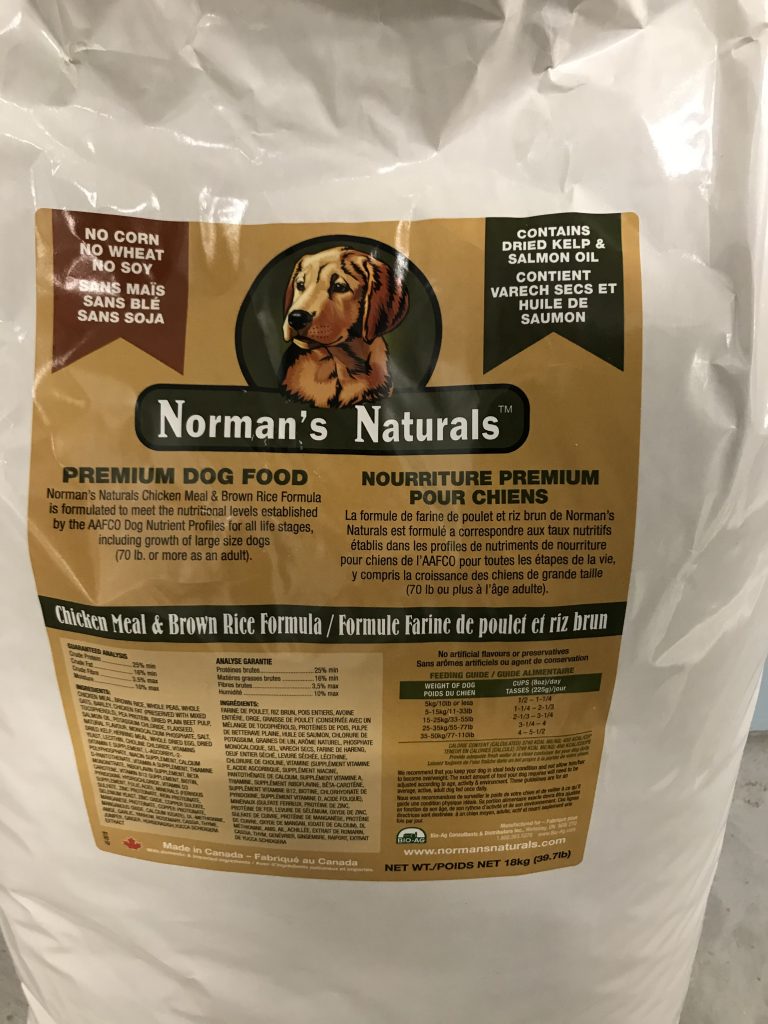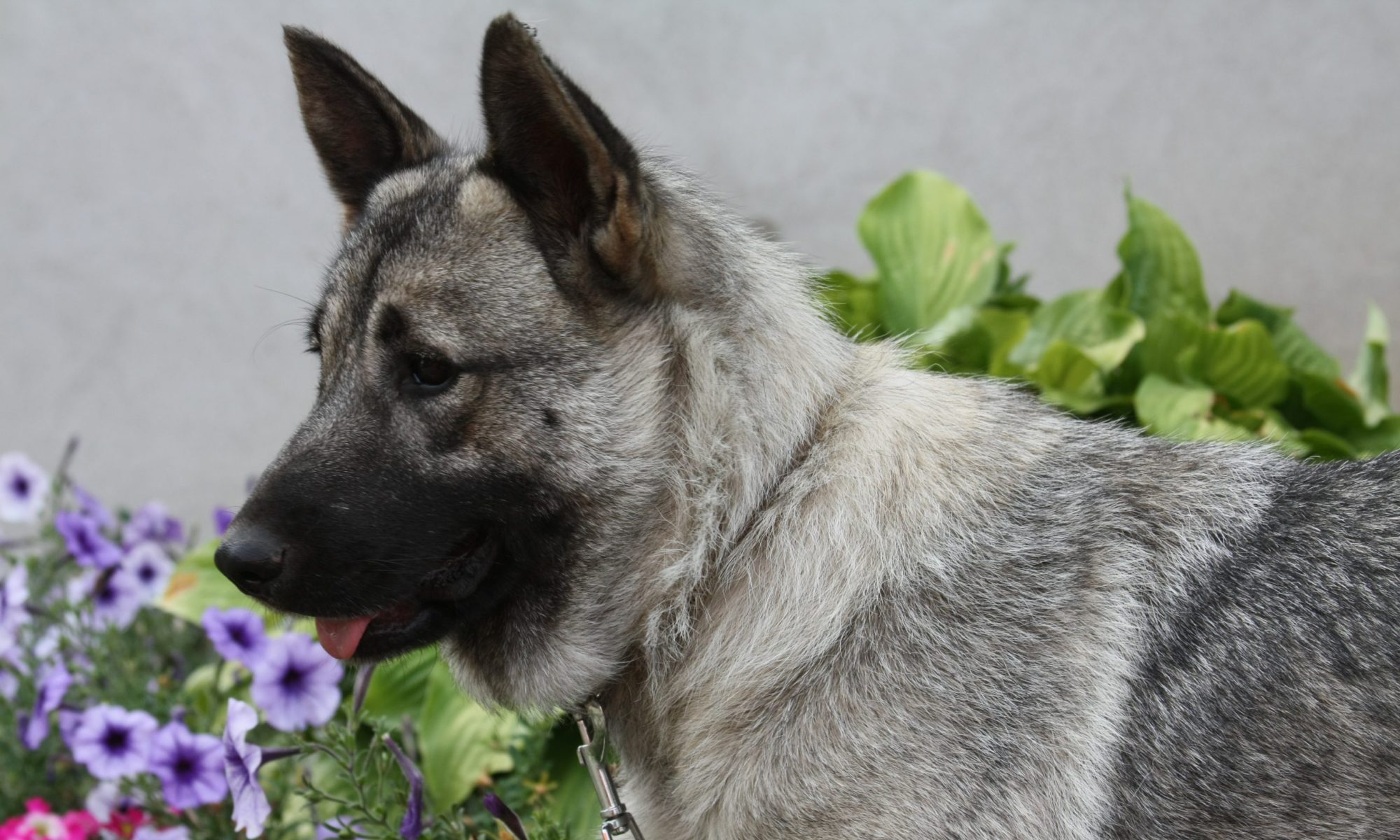Below are a lot of the questions we often are asked about Norwegian Elkhounds, plus a few that we don’t get asked often but which you should know anyway.
Adult Elkhounds grow a few inches higher than the average person's knee, and weigh 45-55 pounds (female) or 55-70 pounds (male).
Absolutely. They're always shedding hair! With regular brushing it's certainly manageable, and we know of various people who have an Elkhound for their house dog. Personally we aren't that fond of hair on the furniture, and our dogs are not in the house. Elkhounds are a rugged dog and happy to live outside, so that is not an issue.
No, our pups are not registered. Some of our females are registered with AKC or with American Kennel Club, and the female that is not registered, could be; because both her parents are papered.
Our male is not registered, and neither were his parents, but we know enough of his history to be sure that he is a pure Elkhound. So while we are confident that the puppies we sell are pure Elkhounds, we can't register them because our male isn't registered.
It depends! Personalities differ from one dog to the next. Elkhounds have a strong hunting instinct and will bark for hours at a treed squirrel, or raccoon, or similar. But they do not tend to make much noise at all when visitors arrive on the yard, unless it's at night and the visitors act in ways that the dog finds unsettling (sudden or strange noises, etc). We have various visitors make comments on how quiet our dogs are when they arrive.
An Elkhound left outside at night may answer neighbourhood dogs, loudly challenge passing coyotes, or take to barking at some strange nocturnal noise; so if you have close neighbours, and you want to maintain your relationship with them, as we all should, you will probably want to take your Elkhound in, or lock him in a kennel, for the night.
A new puppy will tend to whine, and bark shrilly, when left alone for periods of time. Having another dog to socialize with, or lots of interaction time with you, helps a lot.
Elkhounds are most at home outside, in our opinion. They love to run, stretch their legs, and burn energy (of which they have plenty). They have a very warm, thick coat that keeps them warm in the coldest of weather. With a shelter from wind and rain, and of course regular daily attention, an elkhound is quite happy to live out doors.
However, we have sold puppies to folks who have their Elkhounds in the house and apparently it's working well for many of them. The key to having this work well is regular walks -- lots of exercise.
As noted in the FAQ preceeding this one, our dogs are not house dogs so we do not have experience with this directly. All we can say is that several customers have reported that it was easy to potty-train their Elkhound puppy. We'll take their word for it!
A bunch of the food he / she is used to eating, to get you started with familiar food in your pet's new home; and a certificate from our local vet recording the details of vet checkup and the first round of vaccinations.
Our vet provides us with oral dewormer, which we administrate ourselves here on schedule.
Refer to the table below for the guidelines given on a bag of Norman's Naturals dog food. The chart is meant as a reference / starting point; you'll quickly be able to find your way. Just remember that your little Elkhound puppy will be highly food-driven and will have no idea when he's had enough; if you over-feed, he'll just gorge! See chart below for rough ideas if you need some kind of baseline to start from.
| Weight of Dog | Cups / Day |
| 5 kg / 10 lb or less | 1/2 - 1-1/4 |
| 5-15 kg / 11-33 lb | 1-1/4 - 2-1/3 |
| 15-25 kg / 33-55 lb | 2-1/3 - 3-1/4 |
| 25-23 kg / 55-77 lb | 3-1/4 - 4 |
We feed Norman's Naturals, a premium natural dog food that is formulated for all life stages. This eliminates the need to transition from puppy chow to adult food.
If you are interested, we can sell bags of it here. We stock it in 18 kg bags only. This is a lot of dog food, and if you only have one puppy to feed, you will want to store it in airtight containers so it stays fresh.

We do what we can to ensure puppies are healthy when they leave for new homes. Standard practice includes deworming of pups and mother at 2, 4, 6, and 8 weeks; and vet checkup with first round of shots for each puppy.
However, it is possible that something would be missed in this process and if your vet finds a health issue that was obviously present from birth or otherwise came from our kennel, and this condition merits intervention, we ask that you send us a copy of the vet bill and we will reimburse you the portion of the invoice related to the health issue in question. The amount of this refund, or any combined refunds, can not exceed the original purchase price of the puppy.
